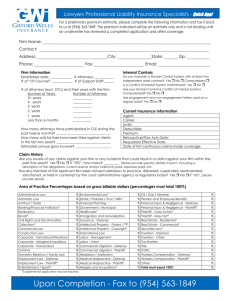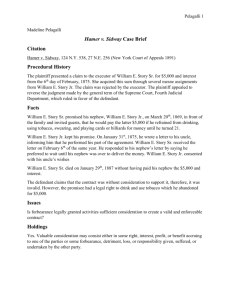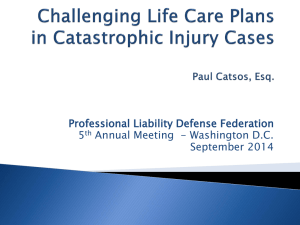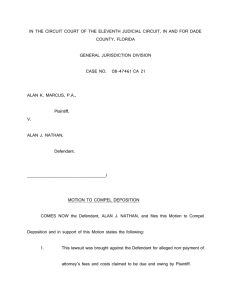REPUBLIC OF THE PHILIPPINES REGIONAL TRIAL COURT
advertisement
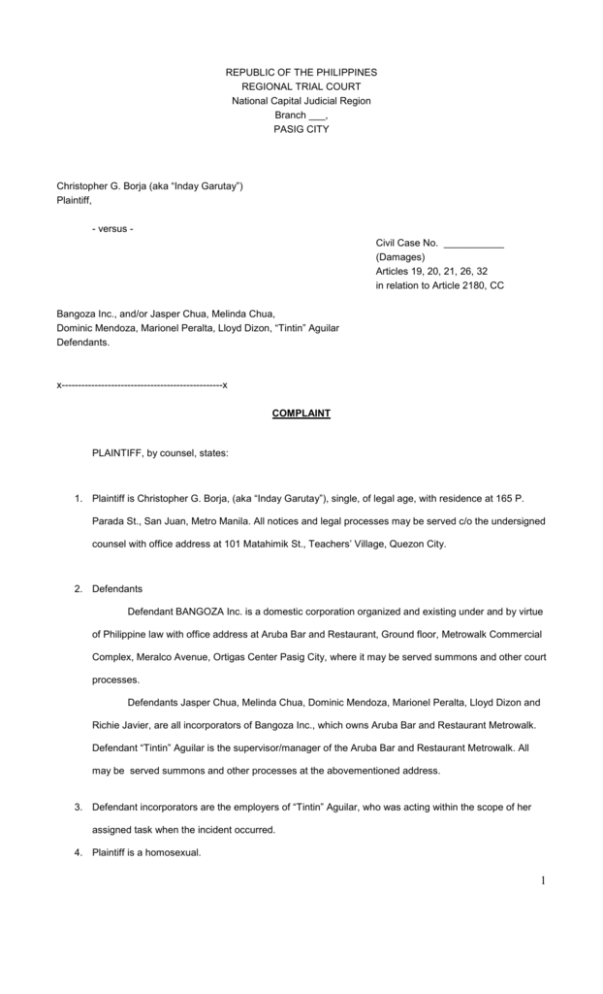
REPUBLIC OF THE PHILIPPINES REGIONAL TRIAL COURT National Capital Judicial Region Branch ___, PASIG CITY Christopher G. Borja (aka “Inday Garutay”) Plaintiff, - versus Civil Case No. ___________ (Damages) Articles 19, 20, 21, 26, 32 in relation to Article 2180, CC Bangoza Inc., and/or Jasper Chua, Melinda Chua, Dominic Mendoza, Marionel Peralta, Lloyd Dizon, “Tintin” Aguilar Defendants. x-------------------------------------------------x COMPLAINT PLAINTIFF, by counsel, states: 1. Plaintiff is Christopher G. Borja, (aka “Inday Garutay”), single, of legal age, with residence at 165 P. Parada St., San Juan, Metro Manila. All notices and legal processes may be served c/o the undersigned counsel with office address at 101 Matahimik St., Teachers’ Village, Quezon City. 2. Defendants Defendant BANGOZA Inc. is a domestic corporation organized and existing under and by virtue of Philippine law with office address at Aruba Bar and Restaurant, Ground floor, Metrowalk Commercial Complex, Meralco Avenue, Ortigas Center Pasig City, where it may be served summons and other court processes. Defendants Jasper Chua, Melinda Chua, Dominic Mendoza, Marionel Peralta, Lloyd Dizon and Richie Javier, are all incorporators of Bangoza Inc., which owns Aruba Bar and Restaurant Metrowalk. Defendant “Tintin” Aguilar is the supervisor/manager of the Aruba Bar and Restaurant Metrowalk. All may be served summons and other processes at the abovementioned address. 3. Defendant incorporators are the employers of “Tintin” Aguilar, who was acting within the scope of her assigned task when the incident occurred. 4. Plaintiff is a homosexual. 1 3. On July 4, 2006, at around 6:30 p.m., Plaintiff entered Aruba Restaurant at the abovementioned address to meet his friend, Sonny Marcelino; as well as his producer for a show in Nagoya, Japan. 4. Plaintiff was accompanied by his partner, Edgar V. Ganapin, whose sworn statement is hereby attached as Annex “A”. 5. Upon entry, the “bouncer” of the establishment saw that Ganapin was garbed in a basketball jersey over a white sleeved shirt. He requested the latter to remove the basketball jersey as it was in violation of their supposed no “sando” policy for males. 6. Plaintiff was dressed in a beige round-neck bell-sleeved shirt and black slacks, a picture of which is hereby attached as Annex “B”. Plaintiff was not prevented entry into the establishment nor was there any intimation that what he was wearing violated the dress code. 7. As plaintiff needed to use the restroom, he proceeded to the female restroom. Ganapin went to the male restroom. 8. When they returned to their seats, defendant “Tintin” Aguilar approached them. These were her exact words: “Sa labas ka na mag-antay.” Plaintiff responded, “Dito nalang ako kasi malamig dito.” She then insisted, “Sa labas nalang kayo.” 9. Puzzled at her insistence, Plaintiff asked her why. She responded in this wise, “Mayroon po kaming dress code dito.” When Plaintiff asked her to clarify, she said, “bawal po ang cross-dresser. Bawal po ang ganyang katulad nyo.” 10. Plaintiff was humiliated by Aguilar’s cold tone of voice and brazenly discriminating manner, so the former told the latter that she had no right to drag plaintiff out of the establishment. Unrelenting, Aguilar replied, “I’m saying it in a nice way.” 11. Plaintiff called his friend, Sonny Marcelino, on the phone to recount what happened and the whole time that plaintiff was speaking to him, Aguilar was glaring at him. Plaintiff could see from his peripheral vision that she was making signals to the bouncer. 12. Not wanting to cause scandal and call any undue attention to himself, Ganapin and plaintiff decided to leave the restaurant. 13. When plaintiff was already outside and was able to take stock of the situation, he decided that he wanted to speak to the manager. He requested the security guard to point out the manager to him, and he was informed that Aguilar was in fact the manager of the establishment. When plaintiff started to enter the restaurant again, the guard prevented him from entering. 14. After being made to wait for fifteen minutes, Aguilar finally showed up. Plaintiff asked her, “Kailan pa nagkaroon ng ganyang rule na bawal ang cross-dresser?” 15. She replied, “It’s a house rule. Aruba has been running for four years with that kind of rule at wala na kayong magagawa doon.” 2 16. As a result of the incident, plaintiff suffered from mental anguish, sleepless nights, and anxiety attacks. 17. Aruba Restaurant has this sign posted at its entrance: “No sleeveless shirts for guys, no shorts, no hats of any kind, no sandals for guys – dress smart, and belong. Management reserves the right to refuse entry to those who are inappropriately dressed, mentally depraved and incorrigibly uncool.” 18. Indeed, while private establishments do have the right to impose a dress code, it may not – in the guise of implementing such a dress code – discriminate against individuals on the basis of his or her personal condition, i.e., sexual orientation. 19. There is a great weight of scientific authority to support the conclusion that cross-dressing inheres to sexual orientation. It has been more than two decades, in fact, since the American Psychiatric Association released findings that cross-gender dressing and gender identity/sexual orientation are inextricably intertwined. 1 20. There being a clear connection between cross-dressing and homosexuality, Aruba Restaurant's prohibition on cross-dressing smacks of the kind of prejudice and discrimination that should have no place in a democratic and pluralistic society. This discrimination is made even more virulent not only because it targets a class of individuals historically vulnerable and marginalized, but because of the insidious attempt to cloak it in the language of benign rule-making and regulation-setting. 21. In other jurisdictions, the legal principle has been laid down that “protection from discrimination on the basis of gender” extends to “protection from discrimination on the basis of gender identity.” This has led 2 to the creation of the “gender non-conformance” legal theory –a theory that essentially states that “discrimination because one fails to act in the way expected of a man or woman is forbidden”. 3 22. In another case applying the same theory (Rosa v. Park W. Bank and Trust Co), a bank was held liable for refusing credit to a cross-dressing applicant, and the Court held that the laws protecting human rights and prohibiting discrimination prevail over private regulations and company policies. 4 23. As a final point, cognizance must be taken of the fact that the Philippines is a signatory to the First Optional Protocol to the International Covenant on Civil and Political Rights, wherein discrimination on any ground – gender, nationality, status, race etc., -- is prohibited. The provisions therein have been incorporated into our domestic law pursuant to Art. II, Section 2 of the 1987 Constitution which states that, “The Philippines xxx adopts the generally accepted principles of international law as part of the law of the land.xxx” 1 Two groups of males were evaluated on parameters of gender identity, initially in boyhood and later in adolescence or young adulthood. One group was composed of 66 clinically referred boys whose behaviors were consistent with the diagnosis of gender identity disorder of childhood. The other group consisted of 56 volunteers selected on the basis of demographic matching. Two-thirds of each group were reevaluated for sexual orientation; 30 of the 44 who previously had shown extensive cross-gender dressing and behavior and none of the 34 in the comparison group were bisexually or homosexually oriented. (Am J Psychiatry 1985; 142:339-341) 2 Price Waterhouse v. Hopkins. 490 U.S. 228 (1989) 3 4 th Schwenk v. James Hartford. 204 F. 3d 1187, 1202. (9 Cir. 2000) st Rosa v. Park W. Bank and Trust Co., 214 F. 3d 213 (1 Cir. 2000) 3 24. To deter defendants from doing similar acts in the future and to deter establishments from committing similar discriminatory practices, they should be order to pay plaintiff exemplary damages in the amount of P500,000.00. 25. To protect his rights, plaintiff was compelled to litigate and for that purposes, engaged the services of undersigned counsel for a fee of P30,000.00. PRAYER WHEREFORE, premises considered, it is most respectfully prayed that Complainant be awarded: 1. Moral damages in the amount of three hundred thousand pesos; 2. Exemplary damages in the amount of three hundred thousand pesos; 3. Attorney's fees in the amount of thirty thousand pesos. Plaintiff prays for other relief just and equitable under the circumstances. 17 July 2006, Quezon City for Pasig City. ROSSELYNN JAYE G. DE LA CRUZ Counsel for the Plaintiff 101 Matahimik St., Teachers’ Village Quezon City PTR No. 7881108/ 6-1-06/ Quezon City IBP No. 683323 / 5-8-2006/ Manila Roll No. 52826 4

![[2012] NZEmpC 75 Fuqiang Yu v Xin Li and Symbol Spreading Ltd](http://s3.studylib.net/store/data/008200032_1-14a831fd0b1654b1f76517c466dafbe5-300x300.png)


